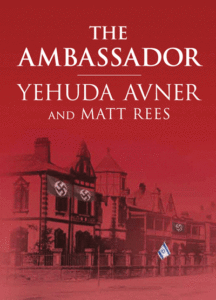The Ambassador, by Yehuda Avner and Matt Rees, Toby Press, 339 pages, $29.95
Reviewed by NEAL GENDLER
One of Jewish history’s intriguing “what ifs” is what might have happened had Britain partitioned the post-Transjordan remainder of its Palestine Mandate into Arab and Jewish sovereignties before World War II.
Such was the 1937 recommendation of the British commission headed by Lord Robert Peel aimed at ending the conflict that accelerated with the Arab Revolt of 1936. Jews would have received a coastal strip from Tel Aviv to Lebanon and about the northern quarter of the land.
Arab rejection and British oil fears shelved the proposal. Worse, Britain’s notorious 1939 White Paper severely restricted Jewish immigration to Palestine, just when it most was needed.

In The Ambassador, Yehuda Avner and Matt Rees propose that Britain did agree to partition, that Israel declared its independence in 1938 and that it won a subsequent, if undescribed, war.
Disappointingly, that’s about as far as their novel takes the idea, focusing instead on Dan Lavi, Israel’s ambassador to the court of Adolf Hitler, and becoming something of an action adventure. It’s interesting, if improbable — a good book to take on a trip.
We do learn a bit about the ambassadorial job, including Lavi’s white-tie presentation of credentials to a glowering Führer who, of course, doesn’t offer his hand.
Ambassadorial niceties were firsthand for British-born Avner, who died in March at 86. The Jerusalem Post called him “the consummate diplomat, orator, speechwriter, essayist and author.” Immigrating to Israel in 1947, Avner fought in the war of independence and helped found Kibbutz Lavi.
Avner was an adviser and English speechwriter for Prime Ministers Levi Eshkol, Golda Meir, Yitzhak Rabin and Menachem Begin; served in Israel’s Washington consulate; and was ambassador to the United Kingdom and to Australia. His 2010 book, The Prime Ministers: An Intimate Narrative of Israeli Leadership, was an international bestseller, leading to documentary and feature films, the Post said.
Rees, a former Time magazine Jerusalem bureau chief and Newsweek Middle East reporter, is an award-winning crime journalist, and The Ambassador unfolds along such lines.
In the book and in reality, the Jewish Agency had a deal to export Germany’s Jews to Palestine/Israel. It’s Lavi’s job to keep the pipeline flowing. Regularly, Lavi trudges to Adolf Eichmann’s office with a briefcase of emigration applications. Diplomatic immunity spares him and his American-born, pediatrician wife, Anna, from the yellow star. They met at Harvard and are just a little too perfect.
Meantime, Lavi’s Mossad station chief, whose wife is the embassy’s codemaster, is determined to kill Hitler, saying that’s what David Ben-Gurion wants, as he plugs away in the basement shooting range.
When war begins, Ben-Gurion must walk a tightrope: Germany says it will halt emigration if Israel sides with Britain, and Britain threatens to invade Israel to protect the Suez Canal if it does not.
The tale includes a German Jew, perhaps the world’s greatest violinist; an anti-Nazi countess descended from Bismarck; a Gestapo surveillance crew headed by a Hebrew-speaker from Israel’s German colony; Anna’s imprisonment; and a dozen B-17 bombers Ben-Gurion supposedly wheedles out of President Roosevelt at the Anglo-American 1942 Cairo conference.
As a British embassy friend burns documents in the fall of 1939, he tells Lavi that the Germans burn books “and we burn memos.” Lavi’s inappropriate response: “We Jews just burn.” No one suspected that then. But I forgive it for the following bit of Brit wit: “Even if it rained, this stuff would burn. Dry as dust, you know.”
It’s all entertaining, if fanciful, and I won’t give away more of it.
The authors say they’ve adhered “as closely as possible to real people, places and events,” with some dialogue quoting contemporaneous notes or Eichmann’s interrogations in Israel. I hadn’t known that Eichmann had a passion for the violin or that SS monster Reinhard Heydrich was a classically trained musician.
The book’s underlying idea — particularly appropriate this month — is that “decisive actions in international affairs can make a difference,” important advice for “a world still engaged in dreadful conflicts and with the potential for even greater ones.”
***
Neal Gendler is a Minneapolis writer and editor.
(American Jewish World, 9.25.15)



















